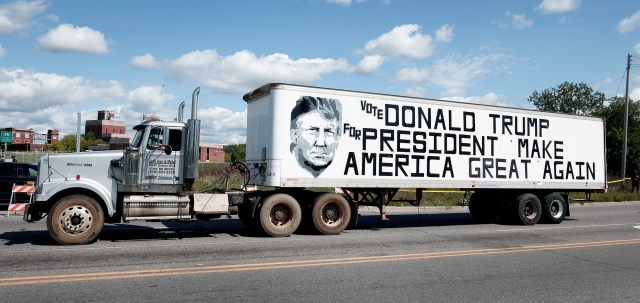Credit: Bill Pugliano/Getty Images

A red baseball cap, emblazoned with the slogan ‘Make America Great Again’, was the symbol of the Trump campaign. Except that it wasn’t a baseball cap, but a trucker’s hat. That was no accident.
In most of the fifty States of America, truck driver is the most common occupation. Trump’s campaign managers knew exactly who they were appealing to.
They also knew what they were appealing to – a sense of working class industrial pride. While conventional politicians like to go on about ‘knowledge workers’, ‘the creative class’ and ‘global talent’, Trump reached out to those who strain their backs and muscles in the workplace, not the gym. And of all the blue collar occupations, which could be emblematic than the one that literally keeps America moving?
Writing for Bloomberg, Conor Sen summarises the importance of what truckers do:
“The trucking industry is unique because it’s the lifeblood of moving goods around the country, representing 70 percent of the nation’s freight volume by weight. Without enough trucks and drivers on the road, some combination of things is going to happen: Shipments will be delayed, and producers will have to pay higher prices to get goods to market.”
Ironically, a shortage of truckers is now one of America’s biggest economic headaches:
“Industry leaders have been complaining about a truck driver shortage for a while, but unlike other industries that have been complaining about worker shortages, we have real evidence both in employment numbers and in business activity that the shortage is starting to have an impact on the economy…
“The level of employment in the truck transportation industry… is essentially unchanged since the middle of 2015. This level happens to coincide with the peak attained in the last economic cycle in 2006.”
Why can’t the industry attract more recruits? Sen provides a surprising explanation:
“Everyone in business and the technology sectors is talking about a future of self-driving trucks – hardly giving prospective workers the incentive to commit to multi-week classes to attain a commercial driver’s license for an industry that might be going away.”
Does the idea that automation causes labour shortages count as an irony, a paradox or a non sequitur?

Perhaps it’s better to think of it as a vicious circle: the push for automation disincentivises investment in skills, with the consequent labour shortages leading to a harder push for automation.
Whatever you call it, this is only going to end one way. Automation will become so widespread as to render the labour shortages irrelevant. (Tesla has already unveiled a semi-automated electric truck that will enable a convoy of vehicles to be driven by a single human driver in the lead vehicle.)
Once the need for human input is greatly reduced or eliminated altogether, a key constraint on growth will be removed. Until that point, however, the constraints may tighten, throttling productivity, increasing costs and pushing up interest rates.
This will be problematic in itself, but worse it will blind governments to what will come next – a wave of automation that will end the limits on productivity, but also millions of jobs.
Donald Trump might like to remember that robots can’t vote.










Join the discussion
Join like minded readers that support our journalism by becoming a paid subscriber
To join the discussion in the comments, become a paid subscriber.
Join like minded readers that support our journalism, read unlimited articles and enjoy other subscriber-only benefits.
Subscribe